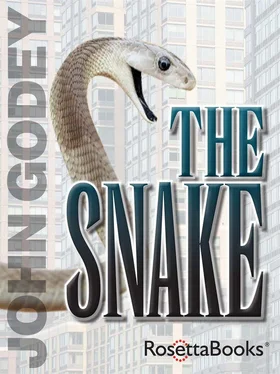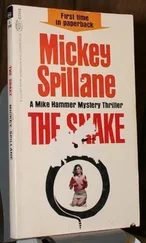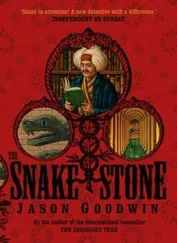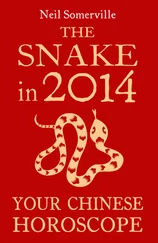John Godey - The Snake
Здесь есть возможность читать онлайн «John Godey - The Snake» весь текст электронной книги совершенно бесплатно (целиком полную версию без сокращений). В некоторых случаях можно слушать аудио, скачать через торрент в формате fb2 и присутствует краткое содержание. Жанр: Ужасы и Мистика, Триллер, на английском языке. Описание произведения, (предисловие) а так же отзывы посетителей доступны на портале библиотеки ЛибКат.
- Название:The Snake
- Автор:
- Жанр:
- Год:неизвестен
- ISBN:нет данных
- Рейтинг книги:3 / 5. Голосов: 1
-
Избранное:Добавить в избранное
- Отзывы:
-
Ваша оценка:
- 60
- 1
- 2
- 3
- 4
- 5
The Snake: краткое содержание, описание и аннотация
Предлагаем к чтению аннотацию, описание, краткое содержание или предисловие (зависит от того, что написал сам автор книги «The Snake»). Если вы не нашли необходимую информацию о книге — напишите в комментариях, мы постараемся отыскать её.
The Snake — читать онлайн бесплатно полную книгу (весь текст) целиком
Ниже представлен текст книги, разбитый по страницам. Система сохранения места последней прочитанной страницы, позволяет с удобством читать онлайн бесплатно книгу «The Snake», без необходимости каждый раз заново искать на чём Вы остановились. Поставьте закладку, и сможете в любой момент перейти на страницу, на которой закончили чтение.
Интервал:
Закладка:
"Arline…" He breathed softly on her cheek, glancing downward at the tender curve of her breast, bra-less under green linen. She turned to him reluctantly, unhappy at being deflected from the play. "Arline." He tuned his voice to a persuasive whisper. "Let's go back to my place." Her eyes kept alternating between him and the stage. "I want to talk to you-seriously."
She made an abrupt gesture, stilling him so that she could catch the next line of the play. Above, somebody was shushing him again. He twisted around to glare back at an angry face covered by black beard.
He faced front, but refused to look at the stage. He fixed his gaze on his knees, sharply outlined by the silk of his trousers. He placed his hands on his knees and molded them, feeling the bone of the patella, the in dentation beneath, the hard bone running down his leg.
Okay. If he was reduced to feeling his own leg for excitement he had bought it. Chalk tip the evening as a disaster and cut his losses forth with. And, of course, take a solemn oath never again to be intrigued by a profile that was less than it seemed, a breast that might well be humid and clammy to the touch.
"I'm sorry, Arline, I'm feeling dreadfully sick."
He was already halfway to his feet. She looked at him in distress. For him, or for fear of having to leave the play? She glanced quickly at the stage before facing him again. The play's the thing! She started to say something to him, but he was already moving through the aisle, bumping knees, murmuring insincere apologies. At the end of the aisle he looked back. She was looking at him, discomposed, uncertain, but it was too late. Even if she were to chase after him, and offer to thrust those little tits into his mouth, he would have none of it.
It occurred to him, as he left the theater, that he would be walking through the park alone, but he wasn't overly nervous about it. There were lots of cops around, and, undoubtedly, the Muggers Benevolent Association had put out an advisory to its membership. The conceit amused him, and he smiled. A couple of cops, lounging on the brick walkway around the perimeter of the theater, smiled back at him.
He headed eastward between the Belvedere Lake and the Great Lawn, on a course that would take him in a direct line to Fifth Avenue. He walked alertly, his eyes moving actively from left to right and behind him-only a fool took anything for granted-but he still saw it an instant before he stepped on it. He saw it but didn't quite believe it, which was perhaps why, with his right foot on the way down to meet the pavement, his reflexes didn't react to compel the foot to step clear over it instead of coming down flatly on its tail.
The tail rolled under his foot (he felt its steely firmness through the thin leather of his sandal) and he no longer questioned the snake's real ity. Revulsion ran through his body from his foot to his brain, and in his effort to step free-though perhaps the writhing of the snake had something to do with it-he lost his balance and fell on it.
The snake whipped back on itself, coiling and twisting to free itself of the man's weight. Its head curved back, mouth wide, and it struck. Its fangs sank into flesh. It bit again. It launched a third strike, but the man was rolling away from it, so that, although one of its fangs penetrated, the other only grazed the target.
The snake lost its balance and fell toward the man. Writhing, its light underside visible, it forced its coils back against the man, and pushed itself away. Quickly, with powerful surging curves, it slithered off the walkway and into the grass.
The sense of unreality persisted.
Roddy Bamberger lay still on the pavement after the snake had gone, as one did in the aftermath of a nightmare, waiting for logic to return, to dislodge fantasy, to re-establish a sense of time and place. Naturally, the details were vivid: the irrecoverable instant when he might have withheld his step, the horrible feel of the snake rolling under his foot, the contortions of those writhing coils, the savagery of the gaping mouth and the head poised to strike…
It was real, it had happened. There would be no waking to thankful relief.
The snake had bitten him. It was a real snake and it had actually bitten him. He recalled the incredibly long, swift strike, the impact of the fangs, not really all that painful, however. He had been bitten on the back of the thigh, not far below the first swell of the buttocks.
He eased his hand fearfully down to his thigh. Some blood, not much.
Suddenly, he felt awful. He was having some trouble breathing God, was he going to have a heart attack? He rolled over and with a good deal of effort got to his feet. He felt lightheaded, dizzy, and his legs were wobbly. He was weak, drowsy, and wanted to lie down. But he resisted the impulse because it filled him with revulsion to think of lying down where the snake had been, where it had left a trail of slime. But that wasn't true. Snakes were not slimy but dry…
He began to run back toward the halo of light that marked the Delacorte Theatre. He ran poorly, stumblingly: his legs were trembling, he couldn't seem to draw a decent breath, his mouth was choked with saliva. But he kept on, driven by terror and the incomprehensible but dread certainty that he was dying.
He collapsed a hundred feet from the theater, and might have lain there until the performance ended if a cop, strolling down the walk for a smoke, had not seen him. He tried to tell the cop about the snake, but he was unable to talk. He was only barely conscious.
There was not even time to call a Code Blue; the patient died thirty seconds after being wheeled in. Dr. Pranay Mukerjee saw the breathing stop, although, in his stethoscope, the heart continued to beat for a measurable time afterwards, perhaps thirty or forty beats. It could not be started up again.
Dr. Mukerjee was an experienced physician. He had served his residency in the Philippines, and was now pursuing his specialty, rheumatoid diseases, at a hospital in Brooklyn. Nevertheless, several times a week he did Emergency Ward duty for the fees, which he dutifully passed on to his family in Calcutta.
He was folding his stethoscope away in the pocket of his white jacket when a nurse carlic hurrying in. "He's dead," Dr. Mukerjee said. "Will you inform the Medical Examiner's office, please?"
Almost for the first time, Dr. Mukerjee looked at the man on the table as a person. In his mid-thirties, well-nourished, extremely well dressed.
A rictus of fright on the face. As noted before, an unsightly dribble of thick mucus in the mouth, on the lips and chin. Dr. Mukerjee lifted the corpse's hand, looked at the fingernails and dropped it. Cyanotic. What was the cause of death? Respiratory failure. According to the police who had brought him in he had collapsed in the park. Drug overdose? Not likely. The heartbeat had been fast and thready, but not abnormally so.
The pupils were not dilated.
Dr. Mukerjee's eye was caught by a small smear of blood on the table. But no wound was visible. Beneath him, perhaps? He turned the corpse over and saw it at once: a slight bloodiness on the trousers, high up on the inside of the left thigh. Doesn't look much, Dr. Mukerjee thought, yet-shall we see?
He cut the left leg of the man's trousers away from the cuff to the belt, spread the material apart and bent low over the thigh. After a moment, he straightened up. Shaking his head, smiling, he said aloud, first in Bengali, and then in precise English translation, "Ah, no, it is not possible, is it?"
The nurse, who had just finished her call, said, "Did you say something, doctor?"
"Yes, nurse. Some alcohol, please."
He swabbed the thigh clean of blood, and studied the affected area intently. There were two pairs of perforations, and a third perforation by itself. No, not quite by itself-in company with a light surface scratch. Below each perforation he could make out a series of tiny in dentations, dropping down in a straight vertical from the perforations.
Читать дальшеИнтервал:
Закладка:
Похожие книги на «The Snake»
Представляем Вашему вниманию похожие книги на «The Snake» списком для выбора. Мы отобрали схожую по названию и смыслу литературу в надежде предоставить читателям больше вариантов отыскать новые, интересные, ещё непрочитанные произведения.
Обсуждение, отзывы о книге «The Snake» и просто собственные мнения читателей. Оставьте ваши комментарии, напишите, что Вы думаете о произведении, его смысле или главных героях. Укажите что конкретно понравилось, а что нет, и почему Вы так считаете.












